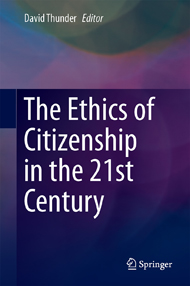An ICS publication calls for a concept of citizenship "that integrates the religious, moral and cultural diversity of today's societies".
Springer, one of the best scientific publishers according to Scholarly Publishers Indicators, has edited the Issue which includes works by experts from universities such as Yale, Harvard or Amsterdam.

A new publication of the Institute for Culture and Society (ICS) of the University of Navarra analyzes the concept of "citizenship" and advocates a "universal and cosmopolitan definition that integrates the religious, moral and cultural diversity of today's societies". This is explained by its publisher, David Thunder, researcher of the ICS's project 'Religion and Civil Societyof the ICS.
The Ethics of the Citizenship in the XXI Century is published by Springer, fourth best scientific publishing house according to Scholarly Publishers Indicators. It collects papers framed in a congress held at the high school in 2014 under the same degree scroll.
David Thunder stresses the importance of defining internship what a citizen is, since this is where political choice and the acceptance of moral and cultural norms fall in the social spectrum. He considers that it is necessary to revise the traditional concept of citizenship because it demanded behaviors and visions that have nothing to do with modern societies and lifestyles.
He affirms that "the concept and the internship of citizenship seem to be undergoing a profound crisis", due to the crisis of the values that shape the concept of civic citizenship and manager towards their community. According to him, in a globalized society with constant migratory movements, the traditional concept of 'citizen' -same ethnicity, religion or culture- has lost relevance.
The researcher, together with other experts from universities such as Yale (USA), the University of Amsterdam (Netherlands) or the Catholic University of the Sacred Heart (Italy); try to clarify this concept in the different chapters of the book in order to provide practical solutions and constructive answers to the crisis of citizenship.
Specifically, they focus on four issues: creating a new theory of 'citizenship' adapted to modernity; defining the moral and emotional ties that constitute the civic link ; resolving the tensions between civic duty and conscience staff; and creating a new multicultural civic ethos.
Chapters and authors-'What Is the Use of an Ethical Theory of Citizenship?' David Thunder.
-'Varieties of Citizenship and the Moral Foundations of Politics' William English.
-'Civic Motivation and Globalization: What Is It Like to Be a Good Citizen Today?' Simon Keller.
-'The Affective Dimension of Citizenship: A Platonic Account' Emma Cohen De Lara.
-'Conscientious Citizenship: Arendt and Aquinas on Conscience and Politics' Angela C. Miceli Stout
-'An Ethical Defense of Citizenship' David Thunder.
-'Confucian Citizenship of Shared Virtue' David Elstein.
-'From Social Practices to Reflective Agency: A Postsecular Ethics of Citizenship' Paolo Monti.
-'Liberal Citizenship and the Search for an Overlapping Consensus: The Case of Muslim Minorities' Andrew F. March.
